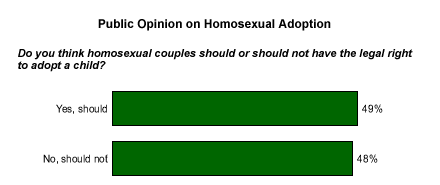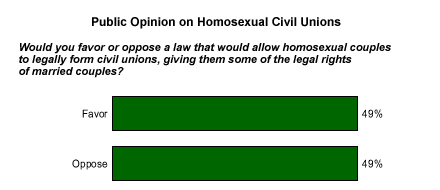The adoption of children by homosexuals sparks fierce debate in American society. It brings to the surface all manner of beliefs and prejudices about children's welfare, the role of the family, the value of tradition, liberty, morality, and socialization. The American public as a whole is evenly divided on the issue. A recent Gallup Poll* found that when Americans were asked, "Do you think homosexual couples should or should not have the legal right to adopt a child," 49% of Americans said they should, and 48% said they shouldn't.

A Good Home
No federal law bans homosexual adoption, but three states do -- Florida is a recent example. In most states, a homosexual couple's chance of adopting depends on the opinions of the county judge in charge of the case, and county judges base their decisions on "the best interest of the child." But, reflecting the poll numbers showing public opinion split down the middle, views on what is in a child's "best interest" are complex.
Dr. Bill Maier, vice president and psychologist in residence of Focus on the Family, a conservative Christian family advocacy group, said, "The American public isn't aware of the facts of gay adoption; if they were, they would have major concerns about endorsing it. Public opinion is based on an excellent public relations campaign conducted by gay activist organizations."
Similarly, Peter Sprigg, the director of the conservative Center for Marriage and Family Studies at the Family Research Council, said, "We don't feel homosexuals can provide children with what they really need, which is a role model of man and woman, husband and wife, mother and father. And there's no substitute for having a mother and a father in the home."
Of course, homosexual parents disagree. Joan Garry is the executive director of the Gay and Lesbian Alliance Against Defamation, and the first homosexual in New Jersey to adopt. "The idea that a homosexual can't fulfill a kid's needs is groundless. Gays and lesbians have parented great kids for years, and only now is it an issue."
Adoption agencies and attorneys facilitate most adoptions. Doug Reiniger, the president of the American Academy of Adoption Attorneys, said, "We look at each adoptive couple individually to ensure that kids' physical and emotional needs are being met. And homosexuals can meet those needs just as well as heterosexual couples. You have to look at people as individuals."
The Public's Opinion
The split in public opinion on homosexual adoption is also seen in other measures regarding homosexuality as it relates to family issues. A May 2003 poll found that 49% favor making civil unions between homosexuals legal, and 49% oppose the idea. When asked more generally about homosexuality, the public tends to be more accepting, and has become increasingly so over the years. Gallup's latest update, from a May 19-21 2003, poll**, finds 59% of Americans saying homosexual relations between consenting adults should be legal.

Bottom Line
For many people, the last word in child welfare belongs to the American Academy of Pediatrics (AAP). In February 2002, the AAP issued a technical paper stating, "A growing body of scientific literature demonstrates that children who grow up with one or two gay and/or lesbian parents fare as well in emotional, cognitive, social, and sexual functioning as do children whose parents are heterosexual. Children's optimal development seems to be influenced more by the nature of the relationships and interactions within the family unit than by the particular structural form it takes."
Such authoritative statements may lead to growing public acceptance of adoption by homosexuals. Nonetheless, the issue is currently so evenly divided and charged with emotion that it will probably be years before America hears the last word on the issue.
*Results are based on telephone interviews with 1,005 national adults, aged 18 and older, conducted May 5-7, 2003. For results based on each sample of national adults, one can say with 95% confidence that the margin of sampling error is ±3%. In addition to sampling error, question wording and practical difficulties in conducting surveys can introduce error or bias into the findings of public opinion polls.
**Results based on telephone interviews with 1,014 national adults, aged 18 and older, conducted May 19-21, 2003. For results based on each sample of national adults, one can say with 95% confidence that the margin of sampling error is ±3%.
